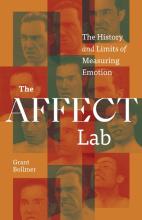
The Affect Lab: The History and Limits of Measuring Emotion
by Grant Bollmer
UNIVERSITY OF MINNESOTA PRESS, 2023, 290 PP.
PAPERBACK, $28.00
ISBN: 978-1-517-91545-2
The Affect Lab: The History and Limits of Measuring Emotion by Grant Bollmer is a discursive and nonlinear account of psychology’s history in North America that shows how the techniques used in labs precede and produce the affects they identify. The titular “affect lab” is defined as the moment of utilization of a technological medium to identify human emotion. Bollmer asserts that in the long-term history of psychology, affect has generally been defined as a neurocognitive universal that exists prior to meaning, consciousness, and interpretation. The author, however, rejects affect as a cognitive universal and explores the historical construction of such psychological concepts, focusing on four key historical moments in the epistemology of technologically mediated emotion.
The four key moments mediated by technology in measuring emotion include William James’s use of automatic writing via planchette at Harvard in the late nineteenth century; the French “Books of Faces,” which documented psychiatric patients’ facial expressions with serial photography around the same time; the Dynograph machine for reading electroencephalography in the 1960s; and the ongoing use of “E-meter” devices in Scientology. The sites for these experiments, which later went on to become a significant part of American psychology, have been diverse and varied, ranging from American psychological labs to European hospitals and Canadian prisons. Tracing the history and background of emotions and affect, Bollmer touches on cultural theorists such as Brian Massumi, Paul Ekman’s monumental affect theory, and even Facebook’s 2015 patent filing for digital camera systems that record facial expressions and assess subjective feelings.
After tracing a general historical context, Bollmer turns his attention to theorizing the specific contributions of key figures and technological instruments that have inspired and sustained the study of affect. He begins with the case of William James’s use of the Boston planchette, an automatic writing tool that James hoped could help understand the supernatural and mystical subjective states that defy empirical science. James believed that phenomena beyond perception were also a part of experience; therefore, the planchette was a tool that could help in discovering not the spirit or medium, as commonly understood today, but rather the idea of a knowing affect that is located first in the body and then materialized.
Next, Bollmer traces psychology’s varied history to the Parisian Salpêtrière hospital, where serial photography emerged as a technique for studying facial expressions—an intellectual path materialized in chapter 2’s “Books of Faces.” These books cataloged the expressions of female patients while also maintaining that there was much that was invisible behind those expressions. Psychologists Pierre Janet and Jean-Martin Charcot used hypnotism, trance, and other psychological methods to study the plight of women hosted in what Michel Foucault called “the great confinement.” This photographic record of female pain, which began in the medical realm, eventually went on to become a foundational document in modern psychology and affect theory.
After establishing late nineteenth-century serial photography’s role in constructing widespread ideas about emotion, Bollmer turns to the case of Franklin F. Offner’s Dynograph machine and its use recording affective states in an abstract, quantified fashion during the mid-twentieth century. The chapter covers two different locales. First, Bollmer introduces the Burden Neurological Institute in Bristol, England, where W. Grey Walter was researching epileptic patients. Concurrently, Bollmer also examines the British Columbia Penitentiary in Vancouver, Canada, where Robert Hare was running experiments on “psychopathic” inmates. Bollmer makes a strong case for the Dynograph as a primary medium leading to the temporal measurements of anticipation in the mind and body, which became a common part of psychiatry during the 1960s. Hare’s concurrent work with “psychopathic” prison inmates focused on emotions as related to temporal judgment; he went on to argue that psychopathy was not mere absence or presence of fear but rather one’s inability to make nonconscious judgment of cause and effect. This in turn implied that psychopaths were, in a sense, brain damaged. The later part of the chapter asks pertinent questions about emotions as temporal and causal.
The book’s last chapter continues Bollmer’s analysis of twentieth-century psychology, but it marks a divergence from previous chapters’ focus on establishment science, examining instead the controversial works of science fiction writer and Scientology creator L. Ron Hubbard. Bollmer examines the metaphysics implicit in Hubbard’s work and relates these philosophical concepts to the therapeutic techniques that he developed. The reader gets a sense of Hubbard’s “Dianetics” theory, derived from Freudian psychology, as well as the E-meter device and the popularity of Scientology. Bollmer posits that the materiality of technological instruments such as the E-meter and the truth of scientific measurements more broadly can never fully transcend the role of discourse and metaphysics in creating psychological data. In many ways, this argument comes full circle to the argument that Bollmer makes in the first chapter about William James’s planchette.
The Affect Lab is a dense but informative read. The challenging moments are heightened by Bollmer’s use of allusions and transdisciplinary references, as the text’s main locus spans a wide array of varied knowledge domains. What keeps the reader on the hook, however, is the author’s quick navigation from one social institution to another. The book transports one quickly from a university lab in Cornell to Salpêtrière in Paris or from a prison in Vancouver to the fictional world of L. Ron Hubbard—all leading to a better and wider understanding of how technology and its use have contributed to the creation and popularity of affect theory in psychology. The strength and uniqueness of the book lie in its nonlinear representation of affect. While the reader may initially be a bit baffled, the dots connect wonderfully by the time one reaches the last page.
—Sakshi Chanana, UNIVERSITY OF PETROLEUM AND ENERGY STUDIES (UPES) DEHRADUN

